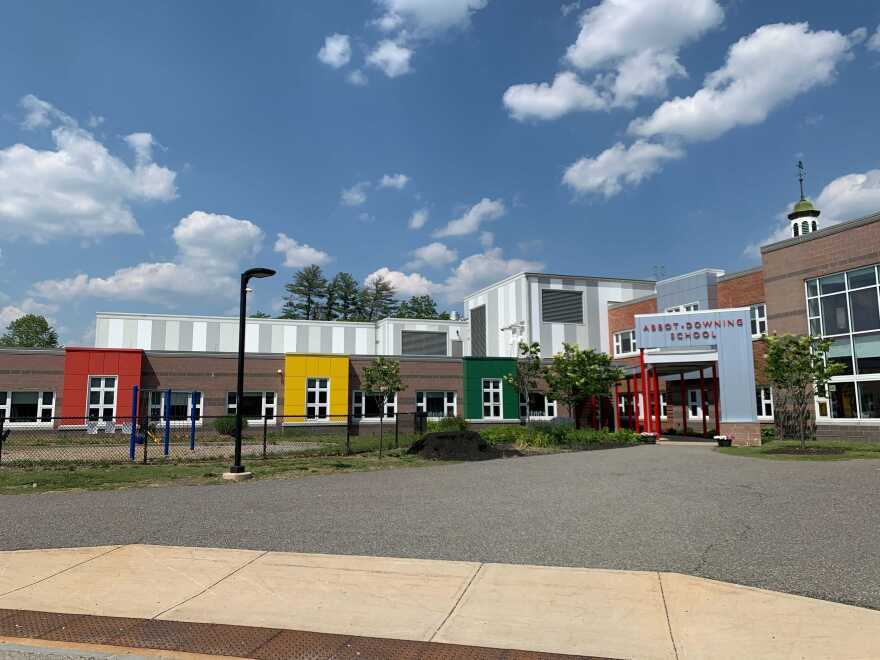School is out for the summer, but the debate over what should be taught in classrooms is still heating up. Gov. Chris Sununu recently signed a law limiting certain kinds of teaching and training on racism, sexism and other forms of oppression.
Some school districts are seeing major pushback from parents and conservative organizations that accuse schools of discriminating against white staff and students.
NHPR's education and demographics reporter Sarah Gibson has been looking into how this is playing out in New Hampshire and other states. What follows is a transcript of her conversation with NHPR's All Things Considered host, Peter Biello.
Peter Biello: So, Sarah, can you explain this new law for us? It's the latest iteration of a bill that started out as the "divisive concepts bill."
Sarah Gibson: So, the law is called the Right to Freedom From Discrimination in Public Workplaces and Education. Basically, it bans advocating or teaching that certain groups of people are inherently racist, sexist or otherwise oppressive, even if unconsciously. And it also promotes teaching that people should treat others without regards to their differences. So, basically equal treatment of everyone, regardless of race, gender, disability, any other category. I should say that most of what's been outlawed is not in curricula in New Hampshire now. Supporters of the law say it's been creeping in. Critics of the law say it's so vague that it will scare people away from having frank and very needed conversations about race, racism and discrimination.
Peter Biello: And other states have passed similar laws this year, right?
Sarah Gibson: Yeah. So, similar measures have been introduced in dozens of states. And then New Hampshire is one of six that have made this law. The language for these bills is based on an executive order from former President Trump, and the federal order was reversed by President Biden but then Republican-led state legislatures really took it on as a key issue. And it's also played out in in the media. So, there's been a lot of attention from the media, which has really propelled the debate. And there's also been a lot of misinformation, both on social media and on news outlets about this.
Peter Biello: And these kinds of bills are getting a lot of attention at the State House and from the media, as you say, but the debate is also playing out on the ground, closer to schools and in school boards and school board meetings and classrooms. So, what's happening there?
Sarah Gibson: So, the law is part of a larger movement by parents and conservative activists to push back on what they see as "liberal indoctrination" of students. And some are sincere in their concerns and others are really exploiting discomfort of staff and students as part of a political organizing tool. So, Reopen New Hampshire, which organized this past year against COVID restrictions, they've been posting about this issue. So have some white nationalist groups in New Hampshire. And then the conservative organization 603 Alliance actually recently released a toolkit to parents and community members, basically about how to fight this indoctrination in schools. They proposed doing a fact-finding mission, basically filing a bunch of Right to Know requests so that people could learn more about the kind of equity and diversity trainings in schools. They said you need to pay attention to school board races and basically get candidates to commit to an anti-Critical Race Theory position.
Peter Biello: What does this law actually look like in practice? If you're a teacher, what are you allowed to talk about?
Sarah Gibson: So, this law does not ban teaching about race or racism. It outlaws teaching certain concepts, like that one race is inherently oppressed, but that's not really being taught in most schools anyway. What this law could do is affect equity, diversity and bias trainings for staff, which we've seen become more popular in the last couple of years. These trainings often do talk about systemic racism and ask staff to examine their white privilege. And many civics and history and social studies teachers are warning that the law could have a really chilling effect on their classrooms. So I spoke to Misty Crompton. She's a social studies teacher at a Derry middle school, and she says the new law goes against the state's Teacher Code of Ethics.
Misty Crompton: It says that we need to value honesty, right? And we have to respect students. But if there's difficult truths about our history, you know, students have questions about those things, you can't just ignore them and pretend it didn't happen.
Sarah Gibson: So this law says teachers can teach the historical existence of ideas. But, you know, teachers have told me students are always making connections to current events. They're hopefully listening to new viewpoints. They're making sense of the past by talking about the present. So, if you're talking about, say, slavery or the Voting Rights Act and then you start talking about society today, teachers worry that this really opens them up to scrutiny and they could be in violation of the new law. So the big consequence of this law could actually just be self-censorship
Peter Biello: And what happens if a teacher steps over the line? Could they lose their job?
Sarah Gibson: If they step over the line and are in violation of this, it's considered a violation of the Code of Conduct. So the Department of Education here would investigate and the DOE will be actually offering technical guidance in the next few weeks on what this could actually look like. But, I should say that the commissioner, Frank Edelblut, is a big proponent of this new law. And so, meanwhile, professional organizations and school districts are consulting with their lawyers to make sure that what they do next year doesn't run afoul of the new law.









